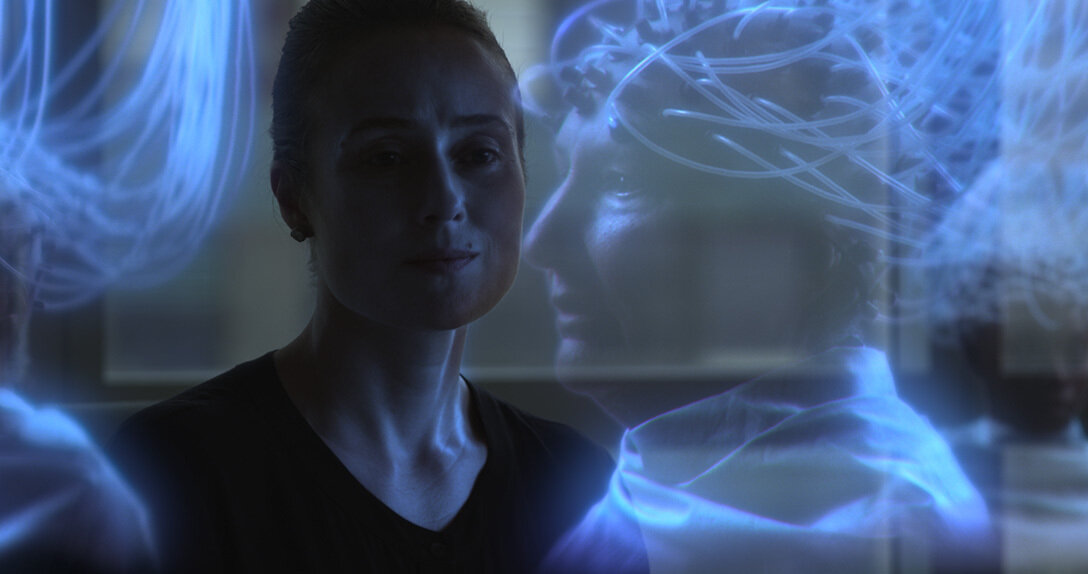Kanopy
By Andrea Thompson
Since everyone seems to be in a revolutionary kind of mood, it seemed like a good time to check out “Born in Flames,” which is another of those films that remained unseen despite the enthusiastic reaction from so many in the feminist community. So I finally decided it was time to correct my lack of knowledge, and...wow.
“Born in Flames” is a deeply radical film, and it will remain so for probably the entirety of history. Many films are being rediscovered and lauded for being ahead of their time, but “Born in Flames” doesn’t just acknowledge, or more accurately, tackle head on what we’re only beginning to approach today, but it takes on genuinely radical actions to deal with them. In fact, some would be justified in calling said actions terrorism, and the discomfort around them remains in today’s environment, although some of that is due to to circumstances out of writer-director Lizzie Borden’s (gotta love the name) control. After 2001, there was going to be more discomfort than usual seeing a bomb go off on top of the World Trade Center building, even if it was designed to take out media messaging, not people.
The result isn’t so much indie filmmaking as guerrilla filmmaking, and the only reason this movie was probably allowed to exist in the first place is that it takes place ten years after the United States underwent a peaceful revolution that’s become known as the War of Liberation, and became a socialist democracy. The problem is that the environment seems all too familiar: a society that vaunts the progress it’s made even as it remains in the throes of high unemployment, and institutional as well as everyday sexism, racism, and classism.
The resulting vision of New York City is hard to pin down to a genre, let alone define. Filmed over a period of five years, and depending on which article you read, on a budget of about $40,000 or $70,000, “Born in Flames” seems part documentary since actual protests as well as staged ones were used, as well as futurist, sci-fi, vérité, queer, and of course, deeply feminist.
Nearly all the main characters are women, many are Black, most are lesbians, and its vision of just how one should fight back against a system which aims to dehumanize and demean are deeply complex. Some women have chosen to fight back via two different pirate radio stations as they broadcast various messages of anger against government actions, while one, Adelaide Norris (Jean Satterfield) has chosen more direct action by becoming a leader in the Women’s Army, which confronts everyday instances of sexism such as street harassment by leading groups of women on bicycles to fight back against the men who brutalize women on the street.
Adelaide is also the one pushing for more direct, violent action against a state that is cutting programs for women, holding them responsible for the hostility and outright assaults they experience, and trying to drive them back into the home by prioritizing male needs and creating new programs such as paying women for housework. But the women, which include Kathryn Bigelow as one of a trio of white feminist editors of a socialist newspaper, remain divided in their oppression. What finally does unite them is Adelaide’s arrest and death under suspicious circumstances while in police custody.
Moma.org
What follows is a kind of feminist wish fulfillment, where women who traditionally divided by race, class, and sexuality band together against their oppressors. Sisterhood becomes powerful, as does their anger, which practically leaps from every frame as “Born in Flames” as it gives a rousing call to action for all women to unite. It’s no accident that the film was rediscovered in 2016, just as Trump was elected and women took the streets and to voice their rage once again. It’s a number that’s loomed large in the history of this film, given the station for one of the pirate radio stations is actually 2016.
In the midst of an election that threatens to keep Trump in power, “Born in Flames” might become disturbingly relevant in a way no one could have foreseen. In just a few months, how largely this film will loom in our culture might be revealed even further.





